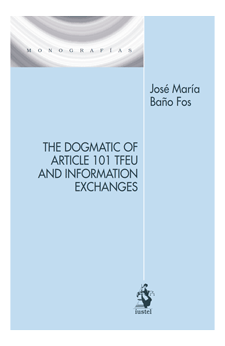Breve reseña de la obra:
Information exchanges are at the heart of most European and national investigations nowadays. In fact, they cover a substantive part of the Commission’s Guidelines on Horizontal Cooperation. In bureaucratic terms, they are a “policy priority”.
However, the development of such an infringement has come at the expense of legal certainty as it implies, de facto, redrawing the red lines that safeguard Article 101 TFEU. By punishing this behavior as a “self-standing” infringement, the area of protection of Article 101 TFEU is broadened. It is no longer necessary to show the existence of a cartel, it suffices to show that the exchange (or disclosure) could most logically end up in a cartel, for the practice to be prohibited and punished.
This raises several questions that this book seeks to answer: is there an economic basis for such a conclusion? If so, does this infringement fit within the wording and purpose of Article 101 TFEU? And ultimately, as with any other infringement, how can we avoid committing type I mistakes while ensuring the effectivity of Article 101 TFEU?
Addressed towards practitioners and scholars this book provides a useful toolkit for analyzing information exchanges and their likelihood to carry out a fine while, at the same time, develops a systematic analysis on the legal nature of Article 101 TFEU.
José María Baño Fos is a member of Madrid and New York Bars and his practice focuses on the intersection of Public, Regulatory and Competition law. Lecturer of Administrative Law and Economic Regulation at the IE University, he holds an LL.M. from Fordham Univeristy (Caja Madrid Scholar) and a Ph.D from the Universidad Autónoma de Madrid. This book is based on the thesis dissertation defended at the Universidad Autónoma de Madrid on July 2015.
This book studies information exchanges as a specific infringement of Article 101 TFEU. Through the analysis of the underlying economic theory and the case law of the European Courts, the book provides a categorization of the different types of information exchanges and shows how the concept has become increasingly blurred (due to the interest of Competition Authorities in sanctioning any conduct which might seem anticompetitive) and the difficulties that any practitioner might face when confronted with an investigation regarding this conduct.

 Cesta de la compra Gastos de envío a España (Península) gratuitos a partir de 45€
Cesta de la compra Gastos de envío a España (Península) gratuitos a partir de 45€
 Comprar
Comprar